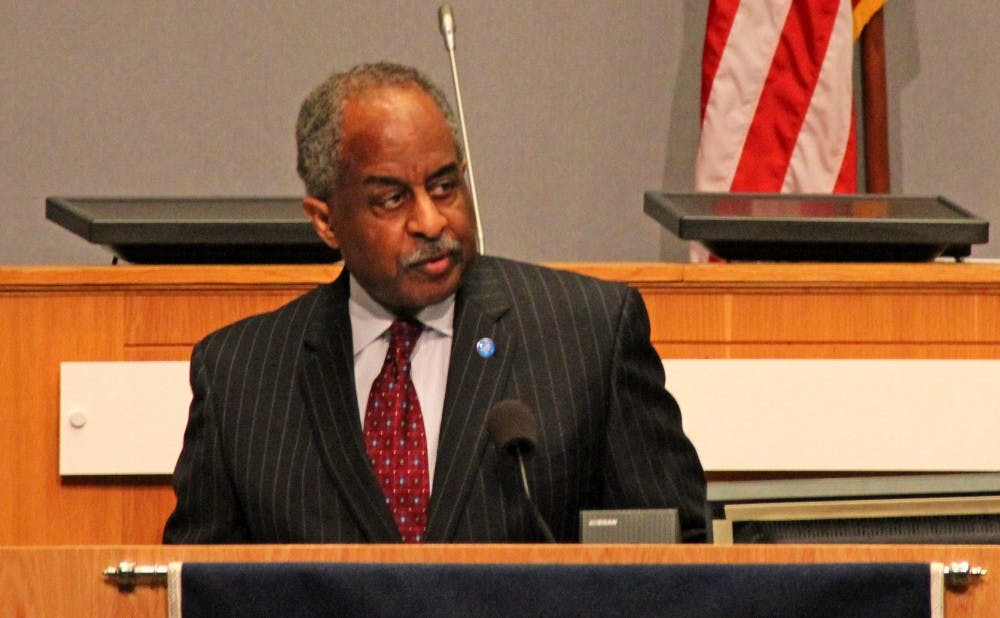The Durham Primary Election forum was held at City Hall this Tuesday.
Mayoral candidates Sylvester Williams, a minister and financial advisor, and Bill Bell, who has served as mayor since 2001, discussed a variety of topics ranging from Durham crime to education. The four city council candidates for Ward 2 and Ward 3 also vocalized their visions for Durham at the forum.
Bail bondsman Omar Beasley and former educator Eddie Davis are city council candidates for Ward 2. Pam Karriker, a former county commissioner, and Don Moffitt, a business development consultant, are in the race to become the city councilman of Ward 3. The forum was conducted in a manner similar to a panel discussion where the moderator, Past InterNeighborhood Council President John Martin, asked a series of questions to the candidates giving them each one minute to respond.
Near the end, the candidates where asked a set of questions that came from the audience followed by their closing statements. The event was sponsored by the League of Women Voters and The Durham Interneighborhood Council, two nonpartisan local political organizations.
“We want to make sure that the people of Durham know who they are voting to represent them and to express what they believe in,” said Bessie Carrington, a member of the League of Women Voters who helped organize the event. “The local government has a huge responsibility to the citizens of Durham.”
Bell and Williams were asked to discuss their take on recent gentrification in Durham.
Bell said he did not see gentrification as a problem, but rather as a chance to revitalize some of Durham’s neighborhoods.
“Durham is moving in the right direction. My focus is going to be on increasing affordable housing and making Durham more neighborhood friendly,” Bell said.
Williams, on the other hand, noted that gentrification in Durham is a problem because it raises the local property value, making it unaffordable to some residents and forcing them to move elsewhere.
Williams also discussed recent criticism that the Durham police department has participated in racial profiling. He called for sensitivity training for all police staff.
Beasley and Davis discussed lowering crime rates in Durham.
Beasley said Durham should focus on keeping adolescents out of gangs. He particularly emphasized the lack of city-funded children activities and how instrumental the addition of such programs can be in decreasing the rate of children who drop out of high school early.
“We need to keep our kids busy,” Beasley said. “Through athletic [activities], academics and activism…we need to identify kids early on who are going to drop out early.”
He also suggested putting vocational and trade programs in school in order to give students marketable skills if they choose not to attend college.
Davis also said Durham needs to focus on homicides because it is one of the major crimes in the Durham community.
“One loss of life is more than enough to handle in this community,” he said.
Karriker said the police department should use more resources to enhance traffic laws and encourage safer streets in Durham. She noted that there is a major lack of sidewalks in Durham for pedestrian use, as well as a need to ensure people do not ride their bikes without reflectors.
Karriker also discussed how there is a deficit of affordable housing for Durham residents.
“I want to make sure everyone in the Durham community has safe and affordable housing,” she said.
Moffitt commented on Durham’s criminal activity.
“I’m seeing more crime in some parts of the city but less crime overall,” he said.
Brenda Rogers, North Carolina president of the League of Women Voters, said the forum gave voters the opportunity to ask questions and evaluate candidates through an objective process.
“The League encourages citizen participation on our democracy through informed voting,” she wrote in an email Tuesday. “We hope that the forum allowed voters to compare candidates and make informed decisions.”
Get The Chronicle straight to your inbox
Signup for our weekly newsletter. Cancel at any time.

